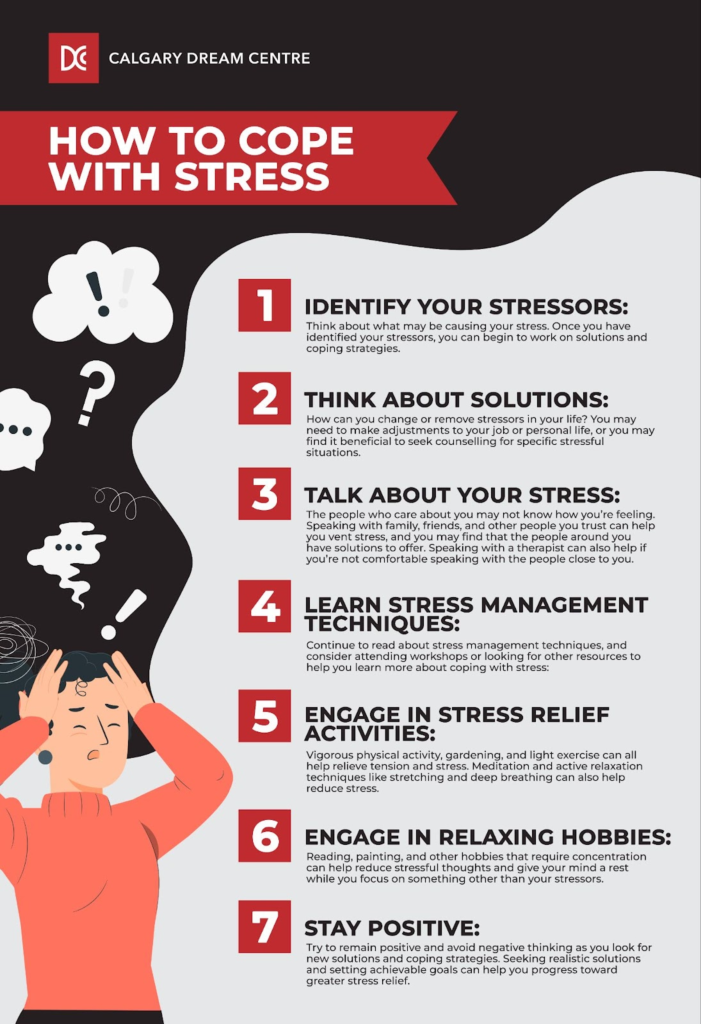Stress affects everyone differently and can stem from many different life events. Whether stress is related to significant past traumatic experiences or new changes, it’s important to know how it can contribute to health conditions like addiction.
There is a link between stress and substance use. Many studies show stress is a leading risk factor for the development of substance use disorder and can be a strong risk factor for recurring substance use.
Understanding how stress affects the body and how to reduce its effects can be helpful for individuals seeking support for addiction recovery, helping them cope with and understand experiences that may lead to substance use.
What Is Stress?
Stress is one one the ways that your body reacts to external stimuli. Stress is a driving force for survival and can be positive at times, it’s what causes you to improve your skills in a certain area—this kind of stress is called good stress.
The negative effects of stress occur when situations cause your body to consume and drain energy faster than it can take in energy.
While some people feel that they thrive on stress, and the effects of good stress can be beneficial, it’s important to understand that the causes of good stress are typically mildly challenging, temporary, generally pleasant, and create a sense of accomplishment.
What Are the Risks of Long-Term Stress?
In addition to the physical and emotional symptoms of stress, the long-term effects of high stress levels can increase your risk of several health conditions, including:
- Heart disease
- Bowel diseases
- Herpes flare-ups
- Mental Illness
- Addiction
Stress is also a known risk factor for Alzheimer’s disease and can make it harder for individuals with diabetes to manage their blood sugar levels.
What Are the Symptoms of Stress?
While the effects of stress can vary from person to person and based on the situation, some common symptoms of high stress levels include:
- Irritability
- Sadness and low moods
- Changes in sleep patterns
- Weight changes
- Difficulty concentrating
- Negative thinking
- Loss of interest or enjoyment in activities
- Restlessness
What Can Cause Stress?
The causes of stress are complex and can vary from person to person. What causes stress for someone else may not cause stress for you. However, there are generally 3 types of factors that can cause stress:
- Emotional stressors include situations like interpersonal conflicts, the end of a relationship, or the loss of a family member.
- Physiological stressors include hunger, sleep deprivation, hypothermia, and drug withdrawal.
- Pharmacological stressors include regular and recurring use of psychoactive drugs.
What Is Addiction?
Addiction is a complicated term that is often used to refer to high-risk substance use and substance use disorder. The term “addiction” may be considered stigmatizing and “substance use disorder” can be used in its place.
One of the reasons that the term “substance use disorder” is used is because it helps reinforce the understanding that addiction is a medical condition with specific symptoms, diagnosis criteria, and treatments, whereas many people may engage in varied degrees of substance use at different levels of a spectrum.
For example, an individual may use substances that are beneficial for their health, such as prescription medication.
Substance use should only be referred to as addiction when it reaches a stage where it involves compulsive use despite the negative effects it causes for that person, their family, their friends, and/or others.
It is important to remember and understand that addiction is a medical condition that affects the brain and it can be treated with the help of recovery programs.

What Is the Connection Between Stress & Addiction?
While it is understood and accepted that stress is a contributing factor to the development of addiction and substance use, the nature of the connection between stress and addiction is still being researched.
There are 2 common subjects of research for understanding the relationship between stress and addiction: psychological connections and neurological connections:
- Psychological understandings of addiction view substance use as a coping mechanism for dealing with stress, reducing tension, and reducing discomfort caused by withdrawal.
- Neurological understandings of addiction are often based on the idea that adaptations in the reward, learning, and stress pathways of a person’s brain may enhance cravings, loss of control, and compulsion.
While these 2 points of view differ in their understanding of addiction, they both recognize and accept the role that stress plays in substance use disorder.
How Can You Manage Stress?
Learning stress management techniques can be an important part of the recovery process for addiction. The coping techniques and strategies that work for individuals can vary, but there are common solutions you can try.
Practicing Mindfulness
Mindfulness is a form of stress management that involves peaceful reflection on the present through focused meditation and open monitoring of your thoughts. Practicing mindfulness is a skill that you can build over time individually and with support from others.
Speaking with a Therapist
Speaking openly about your stress and any related challenges may help improve your mental health. Therapy and counselling can help with processing stress and understanding what contributes to stress to find healthy coping strategies.

Support for Coping with Stress & Addiction
At Calgary Dream Centre, we understand the individual, unique factors that contribute to stress and substance use. We’re dedicated to providing support for people experiencing addiction and helping individuals throughout their recovery journey.Contact us to learn more about how we can help you recover from addiction and reach your goals.



